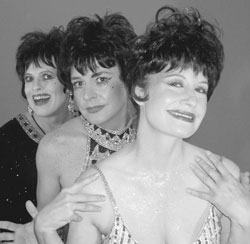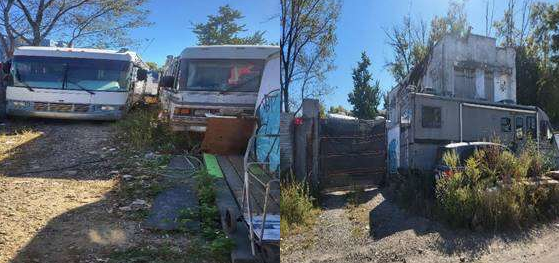By JERRY TALLMER
In a club called Fez, in a basement under the Time Cafe, corner of Lafayette and Great Jones Sts., Liza Minnelli in a golden-tasseled gown is gasping and deep-breathing and whooping and swooping and exclaiming: “It was such a beautiful day for a tragedy!”
Except that this isn’t Liza, it’s Karen Finley in a golden-tasseled gown and black Liza wig. The two-hour show, called “Make Love,” every Sunday night at 8, is Finley’s latest anti-establishmentarian exclamation mark. There are eight or ten assistant black-wigged Lizas in it, two of them male (Chris Tanner, with mike; Lance Cruce at the piano), an ironic accompaniment of sentimental song, and, ça va sans dire (it goes without saying), a plenitude of hyperbole, the more outrageous the Finleyer.
But that line, “It was such a beautiful day for a tragedy,” is not hyperbole at all, it’s just straight recall, and the beautiful day was the sunny, blue-sky Tuesday morning of Sept. 11, 2001, when Karen Finley was on her way to a publishing office on William St. to go over the galleys of “Aroused,” a collection of erotic writings she had edited and contributed to.
“A strange thing had happened earlier that day,” she says over the phone from her home in Nyack. “A peculiar delay. This is not in the show. I remember waking up that morning and seeing the sky so blue, the weather so perfect, no humidity at all. I was supposed to be at the publisher’s at 7:30 a.m., bringing my computer with me, but I didn’t get there that early because of this peculiar event.
“I was going to wear a plaid skirt and a small black top, but when I went to the closet — where water had been coming in from up above — there was what looked like blood on the clothes, on that top, very creepy, like a stigmata. A voice came into my head: ‘This is how accidents happen.’ I decided not to rush, and took a later train.”
The train got her to Grand Central, and the subway got her to the Wall St. area just in time for her to see the first and then the second of the World Trade Center towers falling. If she’d been earlier, they might have fallen on her.
Actually she doesn’t remember what she saw; she was too terrified; she does remember hearing the buildings fall, and running north until she got, if she remembers rightly, to 14th St.
“A lot of people had strange experiences,” she says. “My brother-in-law worked on the 69th floor of one of those buildings. He got a call: ‘Come in late.’ I mean, he never gets a call like that —
“Probably a Jewish plot, an interviewer murmurs.
Finley breaks into laughter. “Yes. Good joke. Thank you.”
Not a joke was the dust that covered Finley’s clothes and body that day, that night — the dust of death. “I washed my hands when I got home, but I couldn’t take a shower. I kept the dust on me. That night is a blank. I’m an artist and a poet: “ ‘Three thousand bodies’ — that was going on in my head. I was crying. I still have those clothes . . . “
“I’m not wearing a Bob Mackie tonight,” gushes giggly Liza in the show. “Liza No. 2 is. I’m wearing an Oleg Cassini . . . Is there anyone in the house who wants to suck a president’s [penis] for world peace?” She chokes with laughter.
“I had this driver taking me to LaGuardia,” Minnelli says. “ ‘When it’s your time to die, it’s your time to die,’ he said to me. ‘The only people who have cars in this [airport] parking lot,’ he said, ‘are not going to collect their cars. Call 777-7777.’
“That’s the reassurance I had from a taxi driver to LaGuardia,” says breathless Liza — and that’s exactly and truly what did happen to Karen Finley shortly after 9/11.
Also this: “Soon after that I was on a plane going to Michigan. There was a Muslim family on the plane, the woman in a burka, with two small children. What with all the chaos and confusion, there were no seats for the two children. I’m holding one of her babies, and at that point some passenger says: ‘The box cutters are in the diaper box,’ and everybody breaks out laughing.”
Ms. Finley says she “knew people peripherally” who died on 9/11, but no one close. “Did you know anyone?” No, I say, I didn’t — but then suddenly remember Berry Berenson Perkins, whom I had interviewed twice, years ago, and had liked twice, and who died in the plane that took off from Washington and crashed, or was crashed, in Pennsylvania.
“Yes,” says Karen Finley, “and she was a friend of Liza’s.”
Come to that, why choose Liza Minnelli as the medium through which to say all this about that beautiful day for a tragedy and the nation’s convulsive aftershocks?
“I like your using the word ‘medium,’ “ says the centerfold-stunning woman who in 1990 had jolted the bluenoses, the Neanderthals, the religiosos, the N.E.A. administrators, and various Supreme Court justices out of their skulls by painting her naked self with chocolate as she voiced a few home truths — her truths, anyway — about men, women, power, subservience, sex.
“When I was using me, Karen Finley, as a character in a theatrical connection, many people looked on me as a Joan of Arc, a liberal bastion of rhetoric, or blame, or sorrow. But I was also, to some people, just coming across as self-indulgent.
“What I’m now dealing with [in “Make Love”] is unresolved childhood traumas disguised as national mourning. Everybody knows the parody Liza, the whole story of Liza’s life — but in spite of it all, she keeps on working, keeps getting up there on stage.
“And that’s New York, isn’t it? New York is Liza Minnelli. So that’s my reason. That’s why she’s the medium [to convey] the grossness of the tragedy, and how panic-stricken or depressed people use this tragedy to show their own neuroses, as well as how everyone has been trying to cope some way out of horror.”
In the show Minnelli/Finley says: “We’ve been running our whole lives from childhood abuse and abandonment . . . Everyone looks as I’ve always felt . . . America was built on and grows from fear . . . National security, national bondage — our country’s an S&M torture chamber.”
Does Karen Finley really believe that?
“Yes, I believe that. Using fear to control people on many different levels is no way to really secure things. Emotional S&M might not be physical S&M, but it gets the same results. And it isn’t necessarily sexual, but it’s a turn-on. They get turned on.”
They who?
“The leaders. Even the nation gets turned on.”
The chief leader at the moment is of course George W. Bush, about whom Liza in the show says, among other things, he “need[s] fear to get it up . . . He loves God so much because he’s never had the love of his own father . . . Bush’s mother is the father of our country” — a wisecrack that gets appreciative applause at Fez.
Now, on the phone: “Well, I think Bush is medicated. As I say, he suffers from father-hunger, and that’s weird because he looks like his father and he is his father. He can’t even love himself. I don’t think he needs to be loved. I think he needs to be [screwed] — to have it worked out sexually.”
The most dramatic moment in “Make Love,” and to this viewer’s mind the most debatable moment, comes toward the end, when Liza & Co. — including Karen Finley’s 10-year-old daughter Violet — break into an intense rendition of Abel Meeropol and Billie Holiday’s “Strange Fruit” — “ . . . scent of magnolias . . . the sudden smell of burning flesh . . . “
That, Ms. Finley, was a song about lynching. Wrong application?
“Well, in a way, it was a lynching, what happened to those towers. That music came into my head,” she says, “soon after 9/11. For months, the smell of 3,000 burning bodies was everywhere. ‘The sudden smell of burning flesh’ — those words hung in my mind — 3,000 bodies, 3,000 bodies.
The burning skyscraper, Liza Minnelli says in Karen Finley’s “Make Love,” was full of artists. “And that skyscraper was you.” Down in the basement under the Time Cafe, one member of the audience suddenly remembers when Norman Mailer declared that the United States was on the brink of a nervous breakdown. That was in the time of the assassinations, of Vietnam, of “Make love, not war” — several centuries, it now seems, before the invention of a new use for box cutters.
Chris Tanner.






































